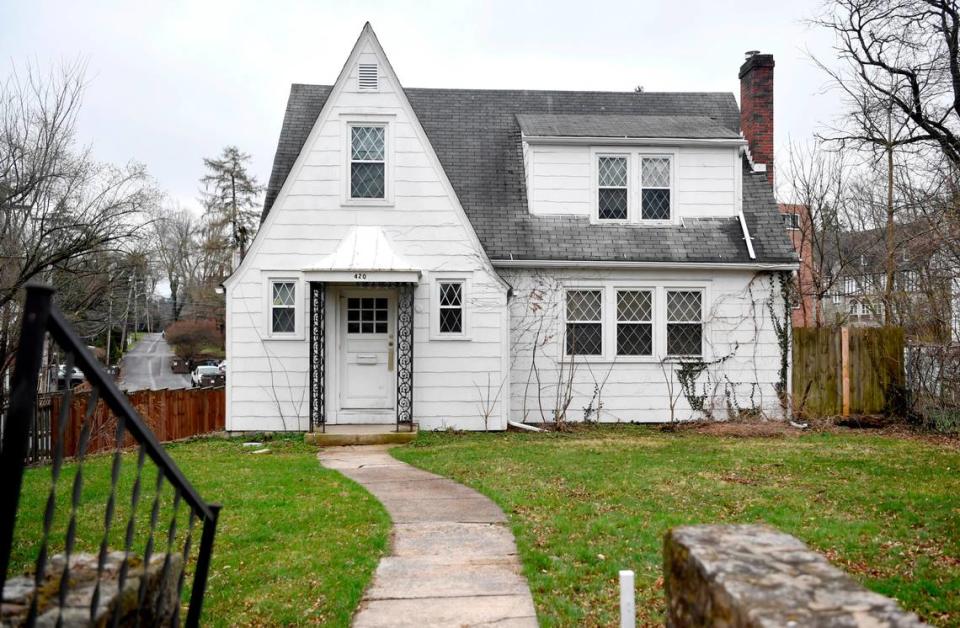Company sues after request to demolish State College historic district home was denied
A real-estate company recently filed a lawsuit after its request to demolish a Sears home in a State College historic district was denied by Borough Council.
Borough Council voted 6-1 on April 4 to deny the company’s formal demolition request, agreeing with a recommendation from the borough’s Historical Architecture Review Board (HARB) about the rental home at 420 E. Foster Ave. The HARB argued that demolition of such historic homes is only permitted in “extraordinary circumstances,” and Burkentine Properties — together with sister company Penn State Ventures — did not meet those circumstances.
In a lawsuit filed earlier this month by Penn State Ventures, the Hanover-based real-estate company argued that Borough Council’s decision should be reversed because, among other reasons, it “violated Ventures’ rights to due process and an unbiased decision-making tribunal.” Penn State Ventures also accused Borough Council of reaching a decision not supported by the evidence.
The borough has not yet formally responded to the lawsuit, and no hearing date has yet been set.
Burkentine Properties, together with Penn State Ventures, purchased the home in the Holmes-Foster/Highlands Historical District for $300,000 in October 2020. Burkentine rented out the 1938 Sears “Lynnhaven” home to students through the spring but, citing “economic hardship,” is now looking to demolish the house and rebuild to see an adequate return on its investment.
Eric Boeldt, chair of the borough’s HARB, summed up his thoughts succinctly during that April 4 meeting.
“If the applicant considers this to be an insufficient return on investment, then the property owners made a bad business decision,” Boeldt said. “And that’s not the fault of the borough or the citizens or the people that like historic districts.”
The Holmes-Foster/Highlands Historical District is a protected neighborhood on the National Register of Historic Places, as it reflects a number of popular architectural styles in the early 20th century. Modifications and renovations to many homes in the district must be formally approved by the HARB, and demolition is only allowed under a strict set of circumstances — such as a building that might collapse or in case of severe financial hardship.
Burkentine has argued that renovations would not make financial sense, as three February estimates put repairs between $715,000 and $750,000. But both the HARB and borough staff cast doubt on those estimates, saying many of those renovations went far beyond what was necessary.
Removing the asbestos siding, for example, is not required if the siding remains in good condition. And in a March 1 letter, the HARB noted that regular Centre Region Code Administration inspections have found only minor or moderate issues, such as needing to replace smoke-alarm batteries, fixing cracked glazing on the front door and repairing deteriorated garage joists.
Burkentine also noted that it operated at about a $5,000 net loss during a 14-month period. But borough officials countered by intimating that loss was misleading due to a one-time $12,000 cost for landscaping. If not for that, officials had said, the real-estate company would have turned a $7,000 profit.
Council member Deanna Behring didn’t show much empathy last month for the company.
“The critical point to me is that the purchase of this house was on 10/15/20, two years after HARB was endorsed,” said Behring, who voted against the demolition. “So the purchasers purchased this property with full awareness of the HARB and its restrictions and guidelines. So that’s the key point to me in my deliberation.”
Both the HARB and two historic districts were created in late 2017, in a move sparked after a homeowner sought to demolish one of the Sears houses in the College Heights neighborhood. At that meeting five years ago, former Councilman David Brown supported its creation — seemingly for cases similar to this. He said at the time he wanted to prevent realtors, developers and speculators from buying up the historic homes only to tear them down or turn them into rentals.
State College Borough boasts two historic districts, in the Holmes-Foster/Highlands and College Heights. The former has 727 contributing buildings, while the latter has 278.


 Yahoo Movies
Yahoo Movies 
